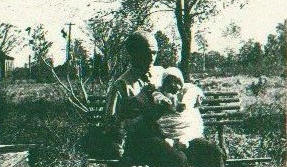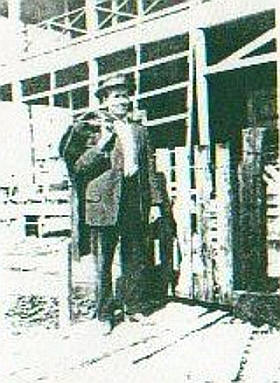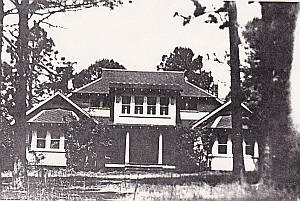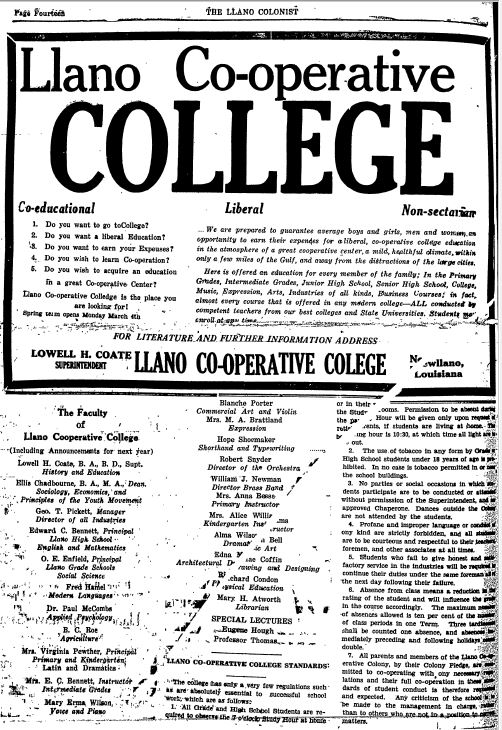
Museum the New Llano Colony
George T. Pickett
Birth: He was born in 1875 at Iowa.
Family Information:
Son of John H. and "Mother" Mary Pickett.
He married his first wife, Melvina Alldredge in 1891 at Nebraska. In 1900 the couple were living in Kansas where he worked as a barber. His brother James lived with the couple and worked as a tailor.
He married his second wife, Minnie (McFee Potter) Pickett in 1904 at Camas, Washington. In 1910 they were living in California where he worked as an insurance writer for a life insurance company.
She joined him in the colony while it remained in California and came for a short time to Louisiana, but returned to California at some point during the early years.
He married Alice Bridger while living in the
Newllano colony, possibly around 1927.
Father of George "Blair" Pickett who was born in the Louisiana colony.
Step-father of her son, Doug Bridger, plus others who didn't live in the colony.
Uncle of Gordon Pickett.
Description: He was about 5'5" tall -- he told his son, Blair, that he was so short because he'd been stunted by his family's trip in a covered wagon to Oregon and Washington in 1880.
Despite his size he'd been a semi-professional football and baseball player. Also, he could play every instrument, except the violin, that he'd ever tried.
He denied being a Socialist, instead he claimed to simply be a radical. He supported unions; according to Blair, "to him the labor union was for the working man, to see that he wasn't tramped on by management."
Pre-Colony History: George's father had been a captain in the Union Army and was a cousin of Confederate Major General George Pickett who'd led Pickett's Charge at the Battle of Gettysburg.
George had been educated in Nebraska and Iowa.
After his family moved to Washington he had become a barber, then sold insurance in California.
He first joined the colony on January 2, 1915.
Home in Colony:
In 1930 he was living in the New Llano Colony with his wife, Alice and son, Blair.
The new Pickett home, made possible only by a dedicated fund-raising campaign handled by Dr. R.K. Williams, was intended from the beginning to be the finest in the colony. This caused problems for Pickett later, when many came to resent his fancy home.
The planned house (still under construction in 1932) was to have had 35 windows on the ground floor, including 5 big bay windows. Pickett, assisted by Roede had planted a home garden around the new house while it was still being constructed.
Job in Colony:
He'd served as a fiscal agent for the Llano del Rio Company during the early days in California and when C.V. Eggleston confided to him that he planned to steal from the colony and offered to let him in on the deal, Pickett informed the Board of Directors, giving Job Harriman the chance to re-organize the colony before any real harm was done.
Also while in California, he began two jobs for which he was well-suited and which would always remain a top priority for him. First, he traveled, speaking to groups about the colony and the co-operative lifestyle; and second, he started the Junior Colony where he worked with the younger generation -- they had their own gardens, repaired the colony roads and were, on their own, building a house for Pickett. He also gave dancing lessons and coached the colony baseball team.
With the absence of Harriman from the Louisiana colony, Pickett soon rose to be General Manager after proving to be a decisive leader, who also happened to be very good at raising funds and finding new members, thereby bringing much-needed money into the colony. A. James McDonald later stated that, "A number of members had confidence enough in him and his business judgment... to lend their money to the colony and thus enable it to continue."
He went on to describe the conditions under which Mr. Pickett had accepted the management -- he was given absolute authority on all matters pertaining to the colony's activities, not only management of the corporation and general business policies, but also the management of the farming and industrial parts, and the educational and social matters. After the dissensions and inefficiency of the earlier experiments with industrial democracy, the Board of Directors agreed to allow Pickett the authority he asked for. While the Board of Directors continued to exist, from that point forward it was basically expected to support Pickett's ideas and wishes.
His son, Blair, agreed with McDonald's account. Years later, after he'd reached adulthood, he stated that, "George was an organizer and he told me several times that he believed in a dictatorship, but a benevolent dictatorship." He remembered the psychological meetings held in the hotel every week or two, where colonists voted on "this issue or that issue," but looking back on it, he felt that George had really just been keeping colonists "informed of what was going on."
In September 1928 Pickett was on the college faculty along with: Lowell H. Coate - Superintendent and instructor in Sociology, Economics and Public Education; E.C. Bennett - English and History; Benjamin Roe - Scientific Agriculture; Guy F. Rogers - Mathematics; Eugene Hough - Psychology; F. Hamel - Spanish, German and Latin; Mary Erma Wilson - Voice and Piano; R.B. Snyder - Director of Orchestra, Wind and Stringed Instruments, Chorus and Ensemble; Geo. T. Pickett - Industrial Science; Daisy Daugherty - Domestic Science; Edna Mae Coffin - Manual Art, Sculpture and Architectural Drawing; Austin McLane - Journalism; Nell Rogers - Botany; Hope Shoemaker - Shorthand, Typewriting and Book-keeping; Mr. Daugherty - Intermediate Grades; Mrs. A.E. Bennet - Primary Grades; Esther Allen - Health and Hygiene; Mary H. Atworth - Librarian and Instructor in the Art of Expression; Anna Tabb - School Nurse, Dr. J.P. Kimmel - College Physician; Alice Pickett - Girls Counselor; Theodore Atworth - Oil and Watercolor Art; Alma Wilson Bell - Dramatic Art.
In 1930 he was listed as the manager of colony industry. However, colony leadership was never easy. From the beginning, both Harriman and Pickett had their struggles with colonists they labeled "brush gangs," though both had always managed to overcome these struggles for control -- usually, trouble started because someone came along who had different ideas and thought they could do a better job of leading the colony. By 1935, however, many had begun to deeply resent Pickett's dictatorial ways. There were many reasons for this:
1) The most obvious reason was that colonists felt that Pickett's family, as well as close friends and supporters, received special treatment. One example of this was the fine home occupied by the Pickett family, while others lived in shacks. In truth, his home had been built using dedicated donations collected from supporters around the country.
2) He had recently pushed for support to purchase several new "satellite locations" where conditions were better to produce specific goods for the colony, including a cattle ranch at Gila, New Mexico and a sugar plantation in South Louisiana. These properties, though "good deals" financially, required colonists to occupy and work them, as well as equipment and supplies that either must be purchased or shared from those the home colony had already managed to acquire. This created a shortage of workers and equipment at the home colony.
3) He had begun to allow new members into the colony who could not purchase their membership stock, which of course, rightly angered those who had bought and/or worked off their fees. To add to the offense, many of these new members weren't able to do their share of the labor required to care for so many colonists. In his defense, it must have been difficult with so many indigent, elderly or disabled citizens knocking on their door, unable to care for themselves and few places offering assistance for them during the depression.
4) And finally, it seems that many colonists, especially the younger ones, wanted to modernize the colony. Their lives had remained just as they had been when the colony was started, though the rest of the world had moved on. They wanted a greater variety of foods for their meals, more fashionable clothing and more luxuries. These were all things they believed Pickett enjoyed while he was on his travels around the country, speaking to different groups about the colony.
On May Day, 1935, some dissatisfied colonists -- most of them younger members who had not yet earned their right to vote on colony decisions -- held a meeting while Pickett was out of town and elected a new Board of Directors that didn't include Pickett. Doc Williams, an on-again / off-again colonist from the early years in California, was elected President; Eugene Carl, a new member who'd only been at the colony about three months -- he was still a probationer and consequently didn't even have voting rights in colony matters, was elected Executive Director; and Walter Robison, also a recent arrival, was elected Chairman of the Board of Directors.
On July 22, 1935, Pickett and his loyal supporters held their own meeting and elected another board which included George T. Pickett as President and General Manager, Arthur Hoffman, H. Claude Lewis, Oscar Needham, Sidney Young, Sidney Archer and John Szpila, an action which created two warring Boards of Directors.
Pickett and his supporters fought the new board in the Vernon Parish courts, but even though the courts did rule that the new board was not legal, they refused to name Pickett's board as the legal directors, so the disagreements within the colony continued to escalate.
Read the Court Judgment dated September 6, 1935.
In order to claim that an official board had been properly elected after the court judgment had been handed down, the new board and leaders held another election. They advertised for former colonists to send in their proxies and adopted a rule permitting all resident members who had been at the colony more than sixty days to vote in the election, provided too few proxies were received to hold a regular stock holders' meeting.
As expected, less than one fourth the required stock was represented at the Stockholders' meeting, so the colonists proceeded with the election of a new board of directors as planned. Those selected were: Robert K. Williams, E.C. Carl, Lester Caves, Crockett Campbell, Harold Emery, Chester Peecher, E.O. Joynes, Charles Lawrence, and Chester Page. Runners up were Mrs. Mabel Busick, Horace Cronk and John Szpila.
The battles for control of the colony continued over the next couple of years, threats were made, there were some physical altercations, and even a few guns fired. Many colonists became so tired of all the fighting they moved away -- leaving an even greater shortage of workers for the industries.
Read about some of the conflict... "Llano Colonist" dated August 3, 1935.
All these upheavals within the colony increased the financial difficulties which had always been part of colony life. The new board had maintained their control of the colony business office, and introduced some new luxuries to the colonists. Newspaper accounts seem to focus less on the agricultural industries that had always sustained the colony and more on the business industries, a number of which had been leased to outsiders. And with the growing shortage of workers, some of their most lucrative industries had to be abandoned.
In April 1936, with finances totally out-of-control, Eugene Carl was appointed as receiver for the colony, though immediate claims of unfitness were brought against him by George Pickett, Walter Robison, and their followers; the court heard evidence on the matter for two days, before the judge announced from the bench that it was his opinion that if a receiver was to be appointed, it should be some person not connected with the corporation.
Richard Pollard, a young businessman from a family that had always been friendly to Llano (even having loaned them large sums of money), was appointed in that same month. Pollard accepted the position with the condition that colonists must agree to work together. He appointed Dr. Robert K. Williams to be his representative in the colony and Eugene Carl to act as his accountant.
In early 1937, when he became convinced that colonists would never be able to work together, Pollard resigned from the receivership and the court appointed C.D. "Dwight" Ferguson.
In May, Ferguson appointed two groups to work with him in an advisory capacity -- first a membership committee who would settle questions about returning members, which might or might not be allowed. This committee consisted of H.S. Stansbury, chairman; George Pickett, E.O. Joynes, R.K. Williams and Carl Gleeser. The second was expected to organize the industrial work so as to ensure that everyone had a job somewhere. That committee consisted of Dr. Williams, chairman; Chester Page, Chester Peecher, Charles Worden and Crockett Campbell.
Finally in June, 1937 some control was returned to Pickett when he was asked to be, first the Farm Superintendent, then the Ice Plant Manager, and eventually in control of all colony industries.
In September 1937 he encouraged everyone to immediately begin planting as much as possible since immediate food production was paramount to the survival of the colony. Pickett stated that he would ensure the entire "Garden Forty" was plowed and disked, but asked every colonist to plant 1-2 acres each with fall crops. Otto Hoeffel, head of gardening agreed that the plan was a hit with him. Cy Horney and J.R. Rude immediately accepted responsibility for their plots.
Unfortunately, it was too late to save the colony; within months the receiver petitioned the court for permission to sell the land and soon began to divide the property into smaller lots which were sold at auction for much less than their actual value.
Other Info:
In May 1928 two visiting musicians -- W.L. Ferris and O.L. Owens of Leesville -- collaborated with the colony orchestra which consisted of: Robert Snyder, leader; George T. Pickett, Roedemeister, Ben Roe, Raymond Faussel, Joseph Gaddis, Louise Gaddis, Billy DeBoer, C.C. Mickey, Peter Borg, Max Beavers, Warren Fread, Guy Rogers, Florence Roe and Anna Besse, pianiste.
In 1928 he was one of the founding members of the local Conscientious Objectors Union; Theodore Atworth served as the first Secretary-Treasurer with O.E. Enfield serving as the President. The organization was planned to be international, composed of people who refused to go to war as a matter of conscience. Charter members included: Theodore Atworth, Mary H. Atworth, Emily H. Dougherty, I.A. Dougherty, Carl H. Gleeser, S. Weislander, Charlie C. Black, John Hight, Lowell H. Coate, W.A. Shutt, F.O. Jernberg, Reka Jernberg, Anna Tabb, Peter Kemp, F. Rosenburg, B. Wade Hewitt, Hamilton H. McClurg, W.J. Hoag, Theodore F. Landrum, C.N. Butts, Mary Snyder, George Snyder, Anna Garrett, Emma Shutt, M.A. Brattland, Richard P. Condon, Jr., Emily Swenson, W.J. Newman, George T. Pickett, Raymond DeFausell, S.E. Baldwin, Mr. and Mrs. Peter Molenar, Earl L. Bosch, Guy F. Rogers, Ora E. Newman, James J. Miller, Bert Busick, Mabel D. Busick, Ole Synoground, C.C. Mickey, Fred A. Jensen, Katie Mickey, F. Rahn and Isaac H. Keyes.
In 1929 the theater program featured camera pictures of Llano, California and Newllano which were shown on a white screen while George Pickett paid tribute to the Auld Lang Syners who had been part of the pioneer days of the colony including: Peter, Dora and Harold Kemp; L. Roedemeister, Dad Thomas and Mr. Fox; Septer, Runa and Rhea May Baldwin; Chas. Anderson, Anton Van Nuland and Theo Landrum; Susan and Albert Moore; William and Mrs. Newman; Arthur, Donna, Donna 2nd and Dolores Goble; and George Pickett himself.
In February 1929 the colony orchestra consisted of Violins: Guy Rogers, William Bingham, Albert Wichmann, Warren Fread, Joseph Silberman, Rhea Baldwin; Flute: Clyde Mickey; Clarinets: Frank Rahn, William DeBoer, William Newman; Saxophones: Raymond DeFausell, Florence Roe, Arthur Goble; Trumpets: Louis Reodemeister, Benjamin Roe; Horn: Benjamin Couchman; Trombone: George Pickett; Tuba: Fred Hamel; Pianist: Mary Erma Wilson.
Post-Colony History: In February 1938 he announced his intention to run for congessman of the Eighth Congressional District, stating he would "advocate a broad plan for better living." The incumbent was A. Leonard Allen of Winnfield, Louisiana.
In 1940 he was living in the unincorporated town of New Llano with his wife and son while he worked as an organizer for the Townsend plan.
Death: He died in 1959 at Caddo Parish, Louisiana and was buried in the O'Banion cemetery at New Llano, Louisiana.
Sources: Nebraska Marriage Records; Washington Marriage Records; US Census: 1900, 1910, 1930, 1940; "Hanford Sentinel": June 12, 1917; Vernon Parish Democrat: April 28, 1921; "Monroe News-Star" (Monroe, LA): January 24, 1927; "Llano Colonist": May 19, 1928, September 15, 1928, December 22, 1928, February 16, 1929, March 2, 1929, March 9, 1929, May 10, 1930, July 9, 1932, January 14, 1933 (The Story of Llano), August 3, 1935, September 7, 1935, February 27, 1937, May 1, 1937, June 13, 1937, August 21, 1937, September 11, 1937; "Can We Cooperate" by Bob Brown; "Bread and Hyacinths; The Rise and Fall of Utopian Los Angeles" by Paul Greenstein, Nigey Lennon and Lionel Rolfe; "The Times" (Shreveport, LA): February 15, 1938; "Southern Exposure": Vol 1; No 3 & 4 (Llano Cooperative Colony, Louisiana); "Weekly Town Talk" (Alexandria, LA): February 19, 1938; Letter dated August 3, 1988 from Rocina Matz to "Florence"; Louisiana Statewide Death Index; FindAGrave.com










Copyright 2018 Museum of the New Llano Colony